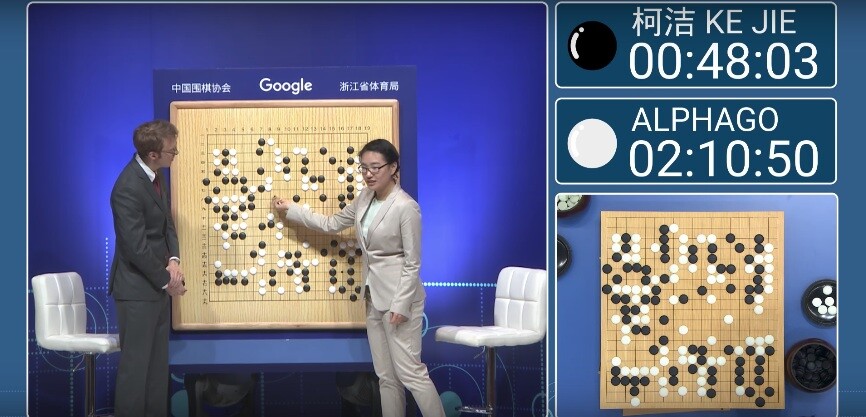Google's AlphaGo AI system has, once again, beaten the very best humanity has to offer. In the first of three Go matches to be played during the Future of Go Summit in Wunzhen, China this week, the AI beat the world's current top-ranking Go player, 19-year-old Ke Jie, by the narrowest possible margin: half a point.
Far more complex than chess, the ancient Chinese game of Go has long been held up as a difficult assignment for AI to tackle. Google subsidiary DeepMind took up the challenge with its neural network AlphaGo, and last year the system proved its worth by defeating South Korean champion Lee Sedol, winning four out of the five matches. That one loss inspired the team to go back and improve the AI, and this year it's returned with a vengeance.
"It was very interesting for us to see this gap in the knowledge of AlphaGo," Demis Hassabis, co-founder of DeepMind, explains in a press conference. "So in the last year we went back and tried to improve the architecture and the system, to learn more and see if we can solve this knowledge gap."
A rigorous training regime saw AlphaGo playing millions more games against itself, but the team says that playing on its own won't reveal its weaknesses. Occasionally the system needs to be pulled out of the lab and pitted against human players like Ke Jie, who's also beaten Sedol and claimed the title of world Go champion.
"Compared to last year, AlphaGo is a completely different player," says Ke. "The first time, AlphaGo was quite humanlike. Now, my understanding is that it's like a God of Go players."
In Tuesday's match, AlphaGo took an early lead, but the game remained close, with the AI eventually beating Ke by just half a point. The system reportedly made some surprising moves, and its creators say that's due to the fact that it's been programmed to avoid risk and maximize its odds of winning. That means that sometimes it will strategically let itself lose points if it thinks that will help it later on.
"I was quite shocked, because that is a move which would never happen in a human-to-human Go match," explains Ke. "AlphaGo is really a very wonderful Go player. I really admire him, I fully respect its skill."
That respect goes both ways, as the DeepMind researchers expressed their thanks to Ke for really challenging AlphaGo.
"Huge respect to Ke Jie for playing such a great game and pushing AlphaGo to its limits," says Hassabis. "It was especially interesting for us to see him use some of the moves from the Master series of games against AlphaGo, and we were very intrigued to see how AlphaGo would deal with its own strategies."

It might look like another disheartening case of humans being usurped by robots, but according to the DeepMind team, AlphaGo isn't designed to replace human players. Instead, the point of the project is to inspire the pros to come up with new strategies, and in that respect it seems to be working.
"The influence of AlphaGo has been widespread," says Ke. "We should explore our mind and expand our thinking. This is something worth our learning for today's Go playing."
With two more games left to play this week, Ke still has a chance to claim victory. Other events during the Future of Go Summit will see two teams go head to head, with one human player and an AI on each team, and a tournament where five human players will team up against AlphaGo.
The livestream of the first match can be seen below, and the post-game press conference begins at around the 5:40:00 mark.
Source: DeepMind





